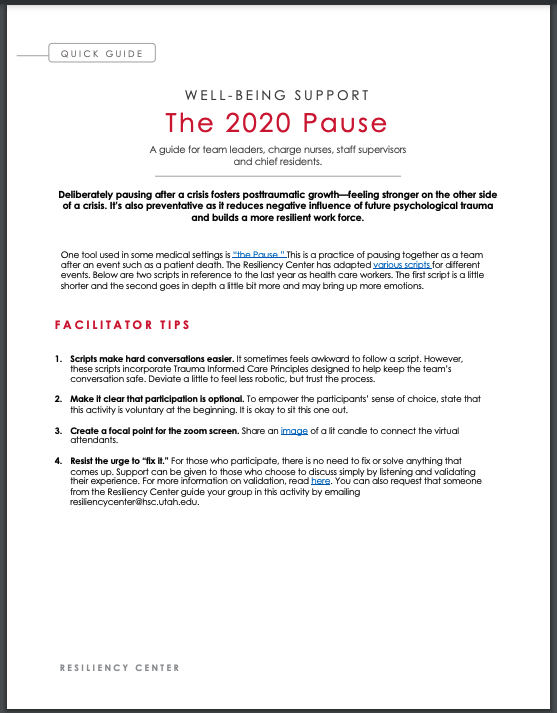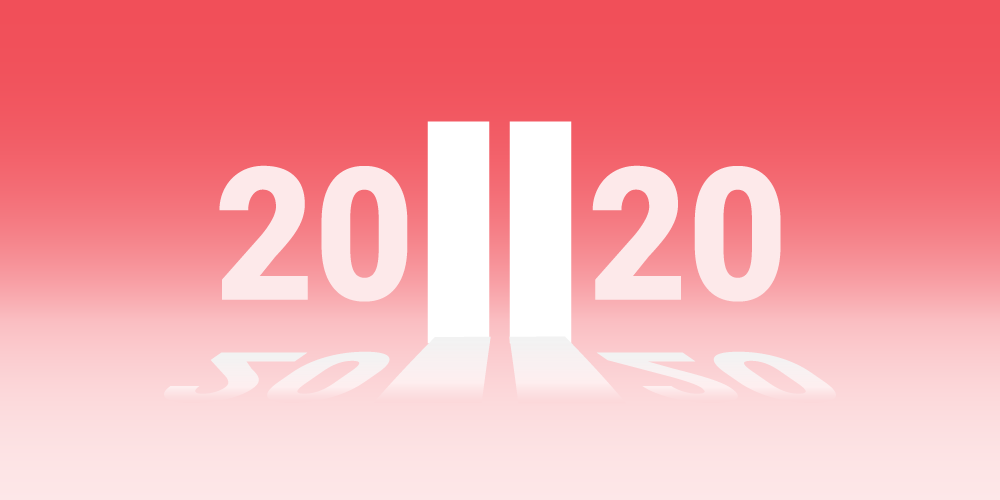eliberately pausing after a crisis fosters posttraumatic growth—feeling stronger on the other side of a crisis. It’s also preventative as it reduces negative influence of future psychological trauma and builds a more resilient work force. It gives teams a chance to recognize and normalize their experiences and encourages a culture of well-being within the workplace.
Quick Tips

Well-Being Support: Download The 2020 Pause guide and Reflection Activity to use at your next team meeting.
The Pause
One tool used in some medical settings is “the Pause.” This is a practice of pausing together as a team after an event such as a patient death. The Resiliency Center has adapted various scripts for different events. Here we provide two scripts in reference to the last year as health care workers. The first script is shorter and the second script goes in depth a little bit more and may bring up more emotions.
Before you begin, here are a few tips to consider when leading this practice.
-
Scripts make hard conversations easier. It sometimes feels awkward to follow a script. However, these scripts incorporate Trauma Informed Care Principles designed to help keep the team’s conversation safe. Deviate a little to feel less robotic, but trust the process.
-
Make it clear that participation is optional. To empower the participants’ sense of choice, state that this activity is voluntary at the beginning. It is okay to sit this one out.
-
If virtual, create a focal point for the zoom screen. Share an image of a lit candle to connect the virtual attendants.
Resist the urge to “fix it.” For those who participate, there is no need to fix or solve anything that comes up. Support can be given to those who choose to discuss simply by listening and validating their experience. For more information on validation, read here. You can also request that someone from the Resiliency Center guide your group in this activity by emailing resiliencycenter@hsc.utah.edu.
The 2020 Pause Scripts
“Before we go forward, let’s take a moment to recognize each other for all that we’ve been through over this past year. While our work is not over, to acknowledge the passing of a year matters.”
“Some of you have been here since last March and before. Some of you have come in between then and now, others have shifted around. No matter your history, that you are here today means that much has been asked of you. As human beings, the world has been called to halt and withdraw from the currents of society. In contrast, within health care we’ve been asked to continue and expand upon already unique normals.”
“There aren’t words perfect enough to name all that we’ve experienced. Each time we reflect, we may get closer to being able to describe what we feel.”
“For today, we will honor each other, ourselves, and those we hold close with a moment of silence.”
30-45 seconds
“As we end this moment, let’s remind each other that this year happened one day at a time. It is likely that restoration will be the same. Our own paths of recovery from this time of our lives will be our own. Today’s pause was brief, but you’ve taken at least one moment of recognition. As we move through to the next moment, let’s find ways to remind each other to be kind to ourselves.”
[end script]
“Before we go forward, let’s take a moment to honor each other for all that we’ve been through over this past year. While our work is not over, to acknowledge the passing of a year matters.”
“Some of you have been here since last March and before. Some of you have come in between then and now, others have shifted around. No matter your history, that you are here today means that much has been asked of you. As human beings, the world has been called to halt and withdraw from the currents of society. In contrast, we’ve been asked to continue and expand upon the already unique normals of health care.”
“Even so you’ve created and found moments of joy, gratitude, or wonder. Even so, connections were formed, released, or strengthened. For some, though not all, there has been valuable time within their own walls with their loved ones. Others have found a sense of normality by continuing to come to their work location.”
“There aren’t words perfect enough to name all that we’ve experienced. Every loss is a transition, and transitions come with the shedding of thousands of layers. Some of those layers were things. Safety, financial security, resources, vacations, gatherings, milestones, destinations. Other layers were more intangible: celebrations, growth, trust, hope, experiences, unfulfilled plans, and time. We’ve worried about the effects of this on those we love most, like our children. And lamented lost time with those in our life who are elderly or with compromised health. Then the world continued to feel less stable. Falsehoods and biases about science, health care workers, social justice, politics, and our changing climate spread confusion and violence. We had hurricane winds, earthquakes, and fires to flame uncertainty where we were once sure.”
“On top of everything, you’ve seen first-hand the passing of so many who lost their lives throughout this pandemic.”
“For today, we will honor each other, ourselves, and those we hold close with a moment of silence.”
30-45 seconds
“As we end this moment, let’s remind each other that this year happened one day at a time. It is likely that restoration will be the same. Our own paths of recovery from this time of our lives will be our own. Today’s pause was brief, but you’ve taken at least one moment of recognition. As we move through to the next moment, let’s find ways to remind each other to be kind to ourselves.”
[end script]
Cite this content: Jean Whitlock, “The 2020 Pause”, Accelerate University of Utah Health curriculum, . Available at: http://accelerate.uofuhealth.utah.edu/explore/the-2020-pause
Megan Jean Whitlock
Taking time to reflect after a crisis is crucial for recovery. The Resiliency Center’s Jean Whitlock shares a helpful exercise for teams to recognize and normalize their experiences, fostering a culture of well-being in the workplace.
The U of U Health Resiliency Center shares a growing list of resources you and your team can use to continue building resilience together.
How do I share employee engagement feedback with my team? Chief Wellness Officer Amy Locke, Resiliency Center director Megan Call, Utah Health Academics HR leader Sarah Wilson, and Organizational Development Director Chris Fairbank explain when and how to talk with your team.
